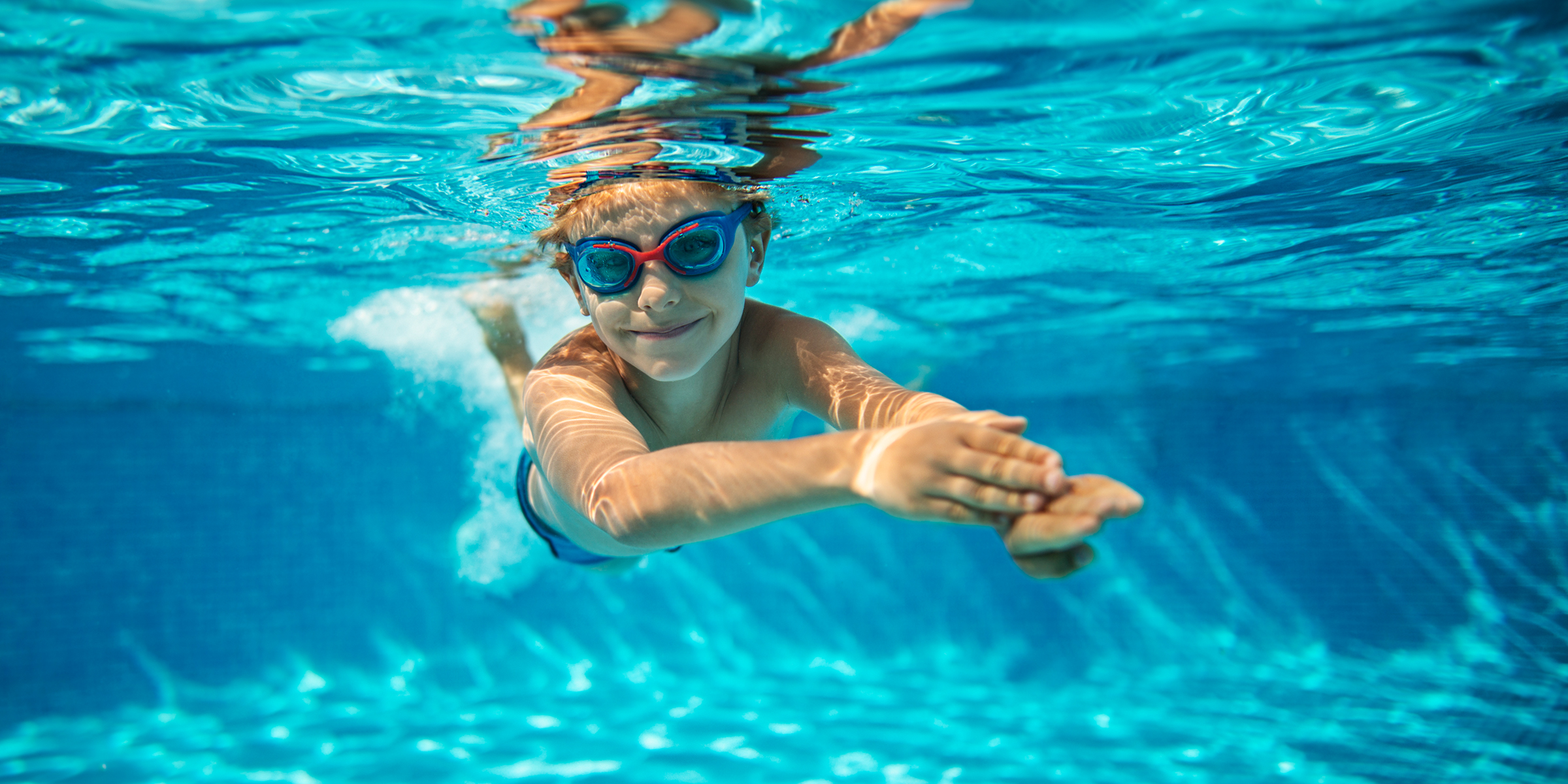If you’re a new pool owner, you may feel overwhelmed by the thought of properly maintaining your pool. But don’t worry; with the right chemicals and knowledge, keeping your pool sparkling clean and safe for your family and friends to swim in, is easy!
In this pool chemical guide, you’ll learn about the chemicals needed to maintain your pool and how to use them. We’ll also answer some frequently asked questions about pool cleaning chemicals.
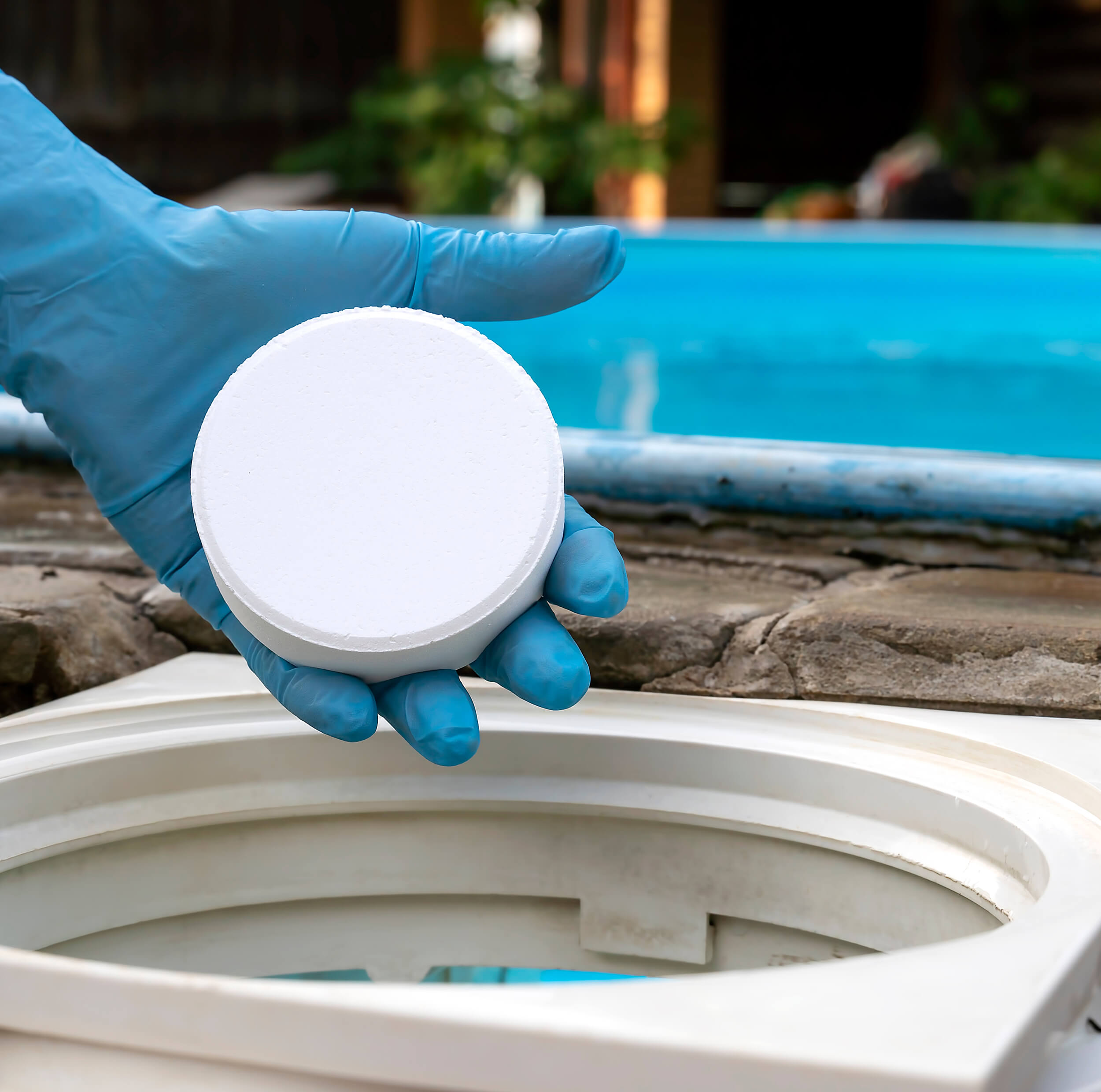
Safety First: How To Handle Pool Chemicals
Swimming pool chemicals can be dangerous if not handled correctly, so safety must be your top priority. Here are some essential safety rules to follow.
Rule 1: Always wear protective gear like gloves and safety goggles when handling chemicals to protect your skin and eyes from irritation or burns.
Rule 2: Store your pool chemicals in a well-ventilated, cool, dry area. Keep them away from direct sunlight and moisture to prevent them from reacting or degrading.
Rule 3: Keep chemicals out of reach of children and pets. Store them in a locked cabinet or shed, and never leave them unattended.
Rule 4: Never mix different pool chemicals together. Each chemical should be added to the pool separately and only in the recommended amounts.
Rule 5: Read the labels on all pool chemicals carefully before using them. Follow the instructions for application, storage, and disposal.
Rule 6: Dispose of chemicals according to local regulations. Never pour them down the drain or straight into the bin.
What Chemicals Do I Need for Pool Maintenance?
Let’s find out what chemicals you need for pool maintenance and how to use them. For more detailed information, read our helpful article, What Pool Chemicals Do I Need?
The following list may seem long, but never fear!
Several of these chemicals require only intermittent use, simplifying the application process by eliminating the need to use them constantly.
So, whether you’re a new pool owner or just need a refresher, let’s dive in!
Algaecide
Algaecides are chemicals that prevent or eliminate algae growth in your pool. They work by disrupting the photosynthesis process of the algae, preventing them from reproducing and causing discolouration in the water.
Before using algaecides in your pool, use Hy-Clor’s AquaChek Test Strips to test your water and adjust the pH level to between 7.2 and 7.6. Then, follow the instructions on the algaecide product and add the recommended amount directly to your pool while the pump is running.
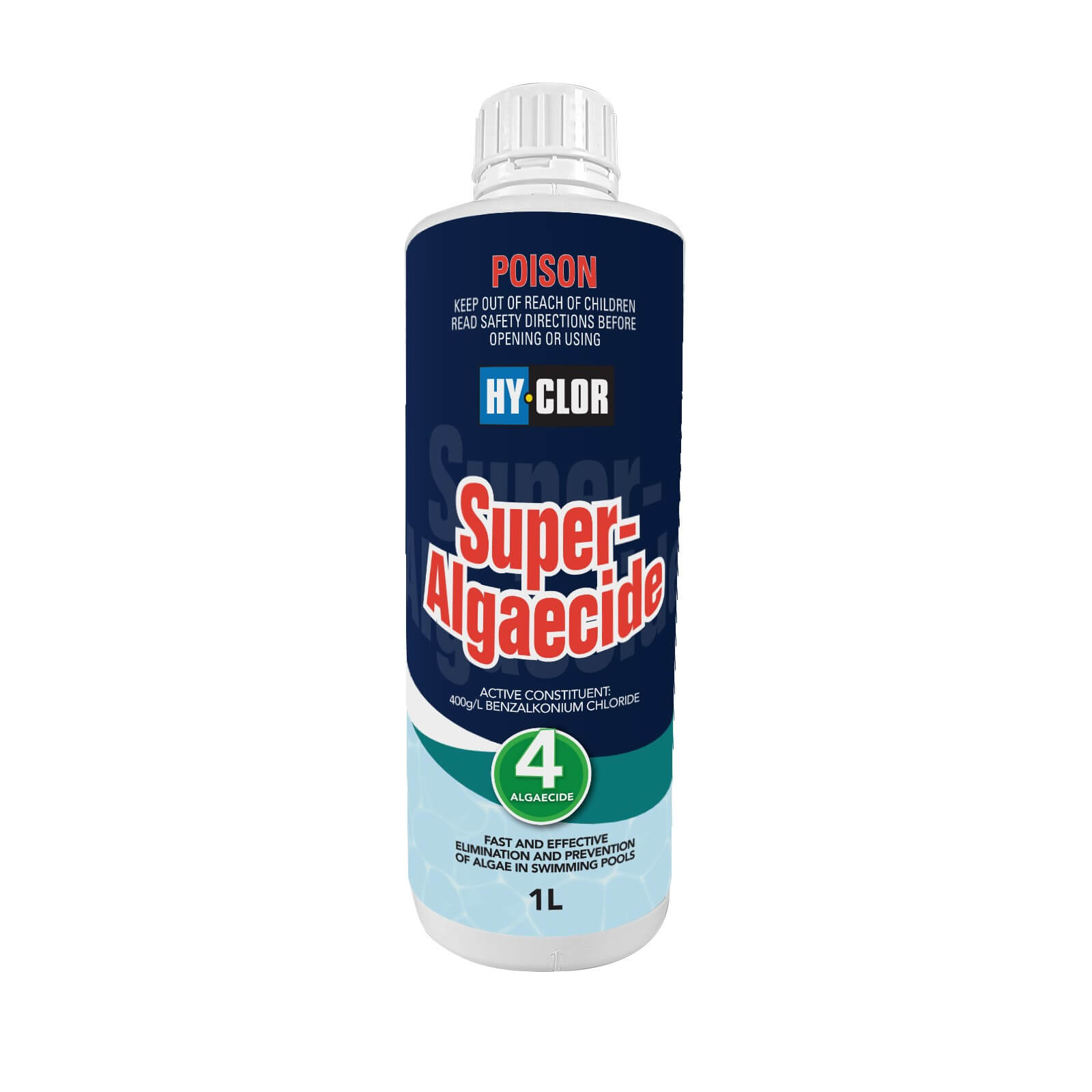
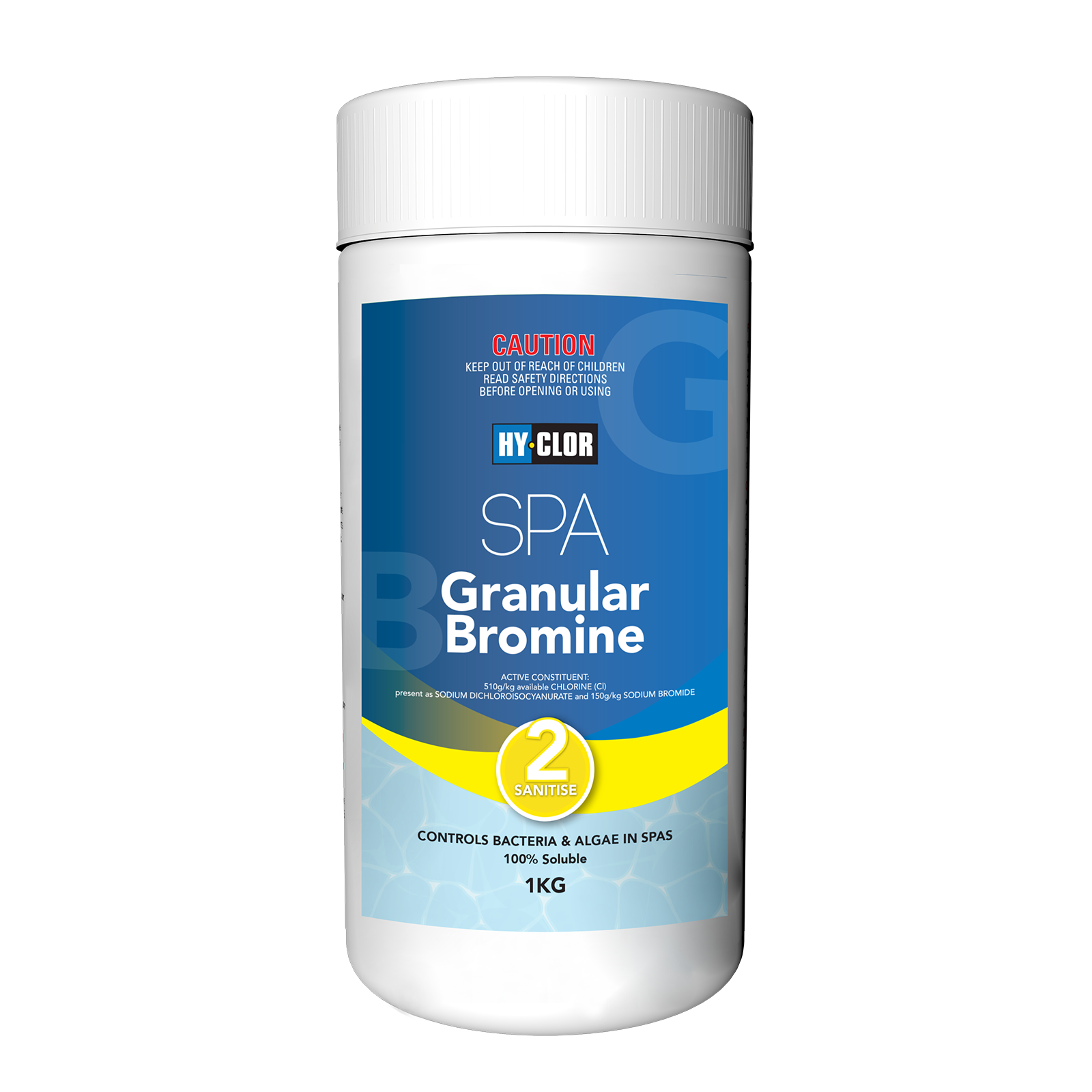
Bromine
Bromine disinfects pool water by killing bacteria and other contaminants. It’s similar to chlorine but less harsh and less likely to cause skin and eye irritation.
Bromine breaks down in direct sunlight faster than chlorine, Bromine is typically more costly than chlorine. Bromine has less oxidation power than chlorine however it is more stable in higher temperatures and is ideal for heated spas.
To use bromine, add the recommended amount to your pool water and use a test kit to maintain a level of 3-5 ppm (parts per million).
Calcium Chloride
Calcium chloride is added to pools to increase calcium hardness, which prevents damage to pool surfaces and equipment and improves water quality. Pool surfaces can get damaged if the water in the pool is too low in calcium hardness. This can cause the water to become corrosive, leading to etching and staining of the pool surface, tiles, and grout. Low calcium levels can also cause the pebble pools to deteriorate or cause calcium to be drawn out of the concrete walls which leads to bad staining and a rough and uncomfortable surface for swimmers.
This chemical is typically used in pools with soft water or after heavy rainfalls. Soft water refers to water that contains low levels of minerals, particularly calcium and magnesium.
Add the recommended amount of calcium chloride to your pool water while the pump runs. When tested, the calcium hardness level should be between 200-400 ppm for pools and between 150-250 ppm for spas.
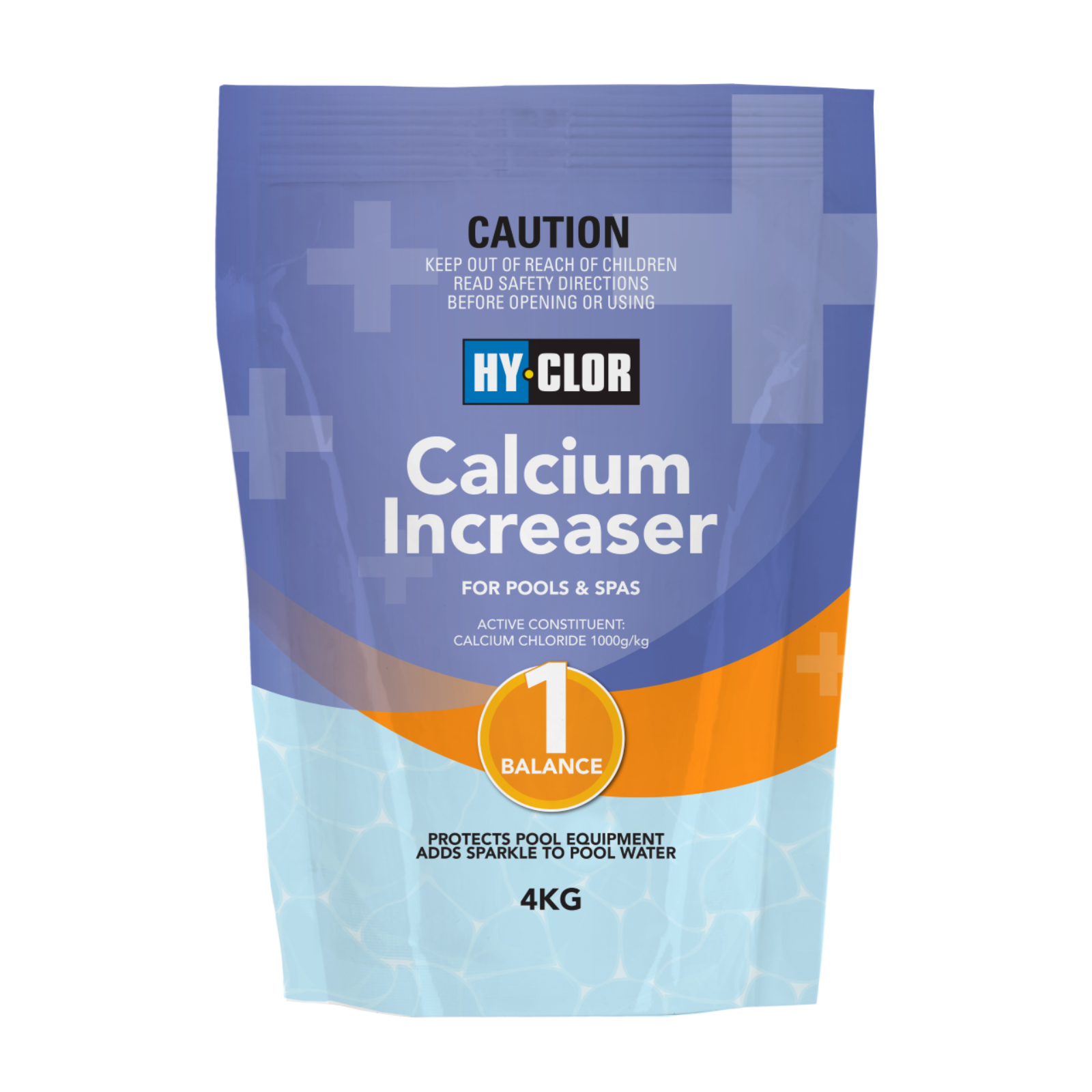
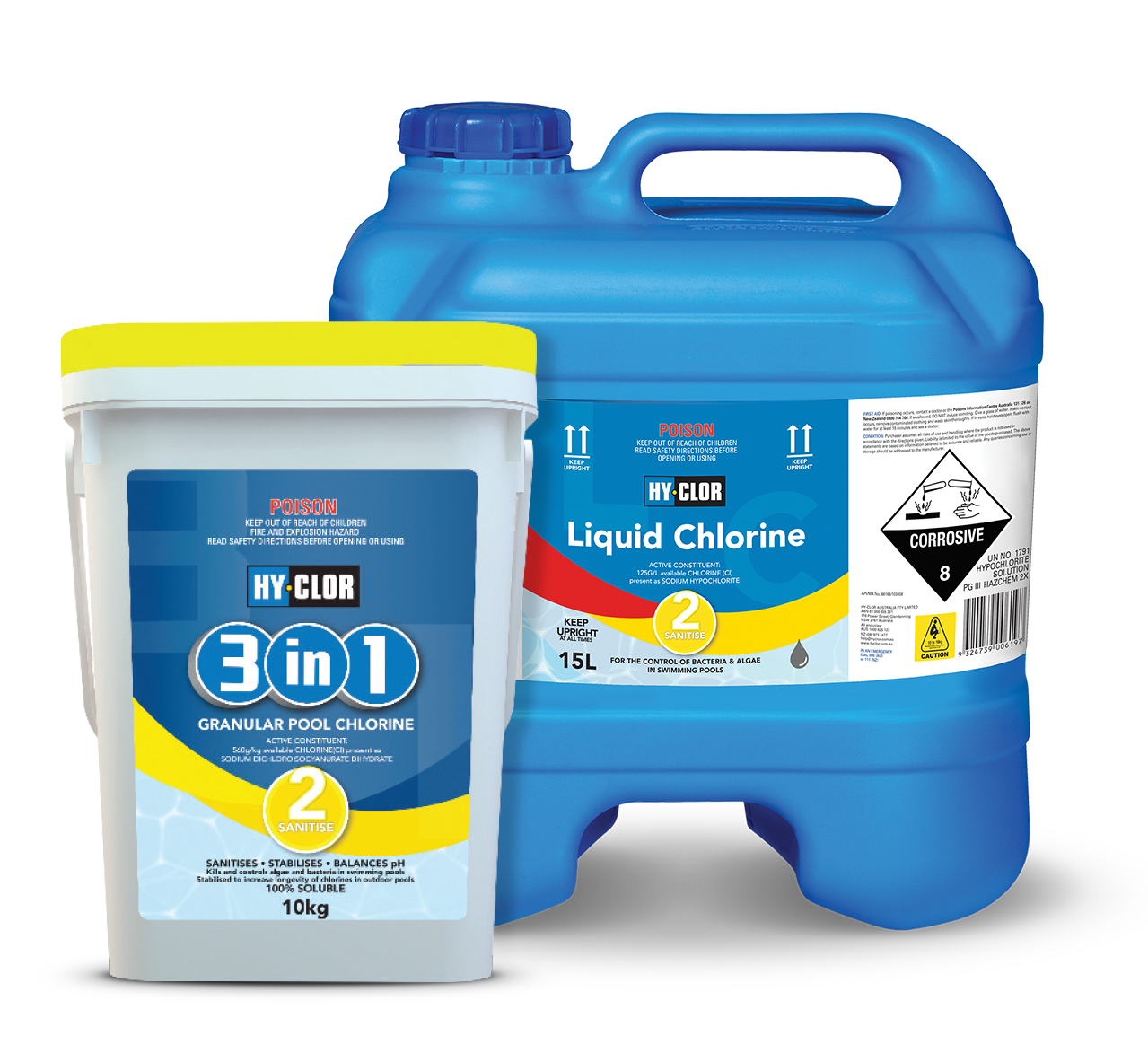
Chlorine
While all pool cleaning chemicals play important roles in maintaining safe pool water, chlorine is widely considered to be the most crucial. Chlorine sanitises and disinfects pool water by killing harmful bacteria and viruses. It’s available in liquid, granular, and tablets.
To use chlorine, follow the manufacturer’s instructions and add the recommended amount to your pool. We recommend maintaining a chlorine level of 1-3ppm is the general rule for chlorine in the pool, and 3ppm for the hotter months of the year.
Clarifier
Pool clarifier help to improve water clarity by binding together the tiny particles floating in your water so your filter can easily discard them.
To use a clarifier, add the recommended amount directly to your pool while running the pump. Allow the clarifier to circulate for several hours, and then backwash or clean your filter to remove the bound particles.
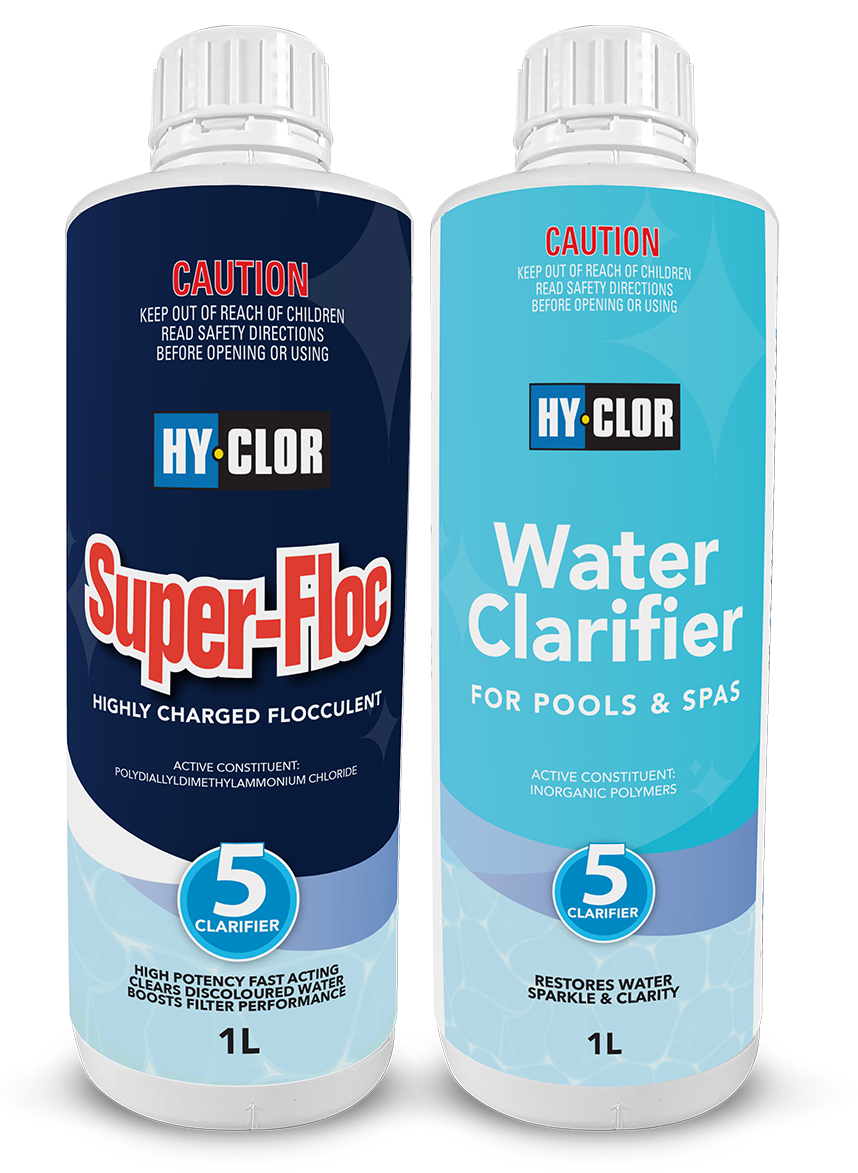
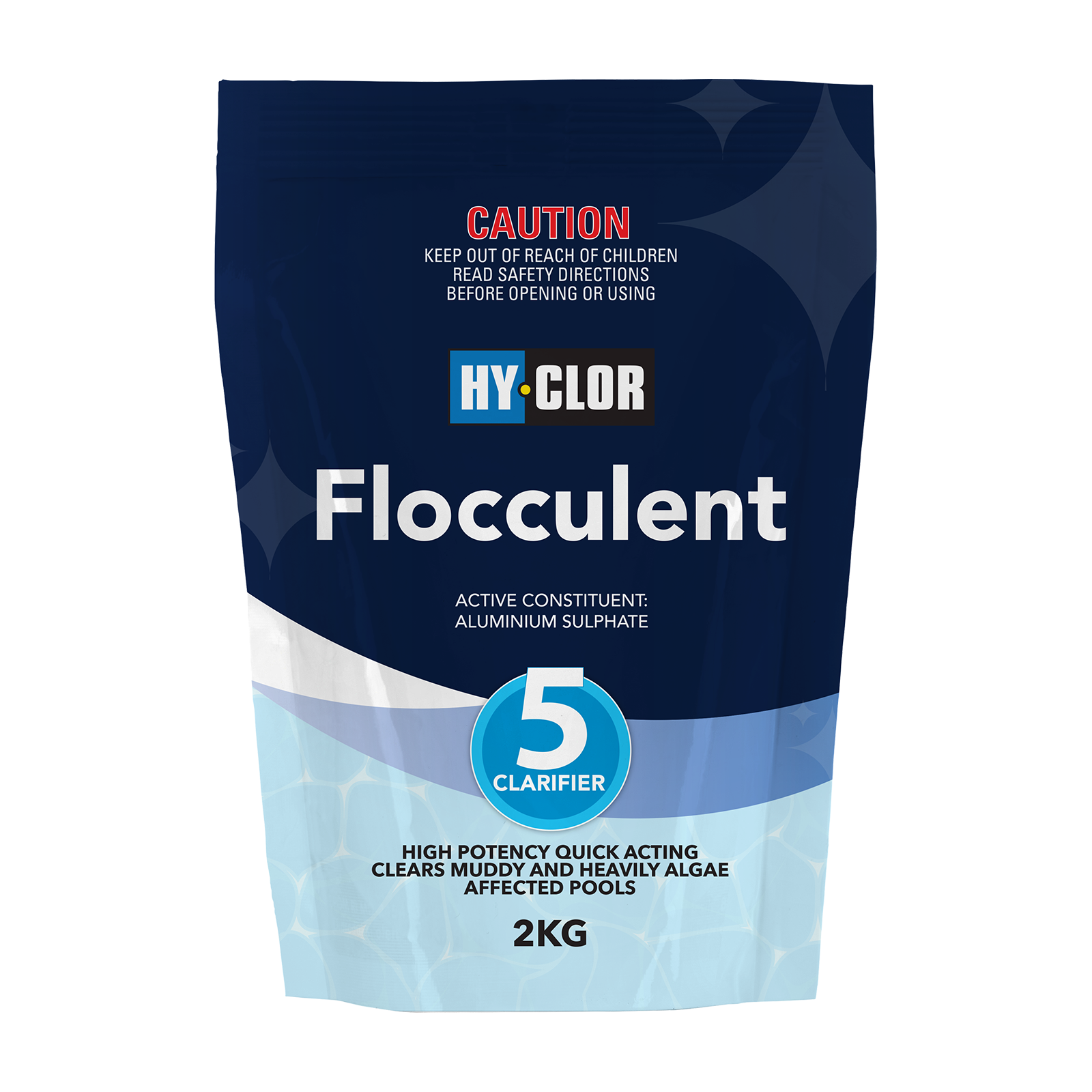
Flocculant
Flocculants work the same way as clarifiers; however, they’re more suitable if your pool is so cloudy you can’t see to the bottom. Pool flocculent thickens small debris and contaminant particles and binds them together. They then sink to the floor, allowing you to vacuum them up.
To use a flocculant, follow these instructions:
- Add the recommended amount to your pool water and allow it to circulate for several hours.
- Turn off the pump and let the water sit undisturbed for 12-24 hours, allowing the particles to settle to the bottom of the pool.
- Vacuum the particles to waste.
Note: Only suitable for Sand Filters or pools with a Vacuum to waste option.
pH Balancer
pH Balancers help maintain the proper pH level in your pool water. This balance ensures swimmers’ comfort; without it, they risk developing skin rashes or having the water sting their eyes.
If the pH levels are too high or too low, the effectiveness of chlorine or other disinfectants may be reduced. Correct pH balance also ensures swimmers’ comfort; without it, they risk developing skin rashes or having the water sting their eyes.
To use a pH balancer, first test the pH level of your pool water. Add a pH increaser if the pH level is too low (below 7.2) or a pH decreaser if the pH level is too high (above 7.6).
After adding the pH balancer to your pool, allow the water to circulate for several hours before retesting and adjusting if necessary.
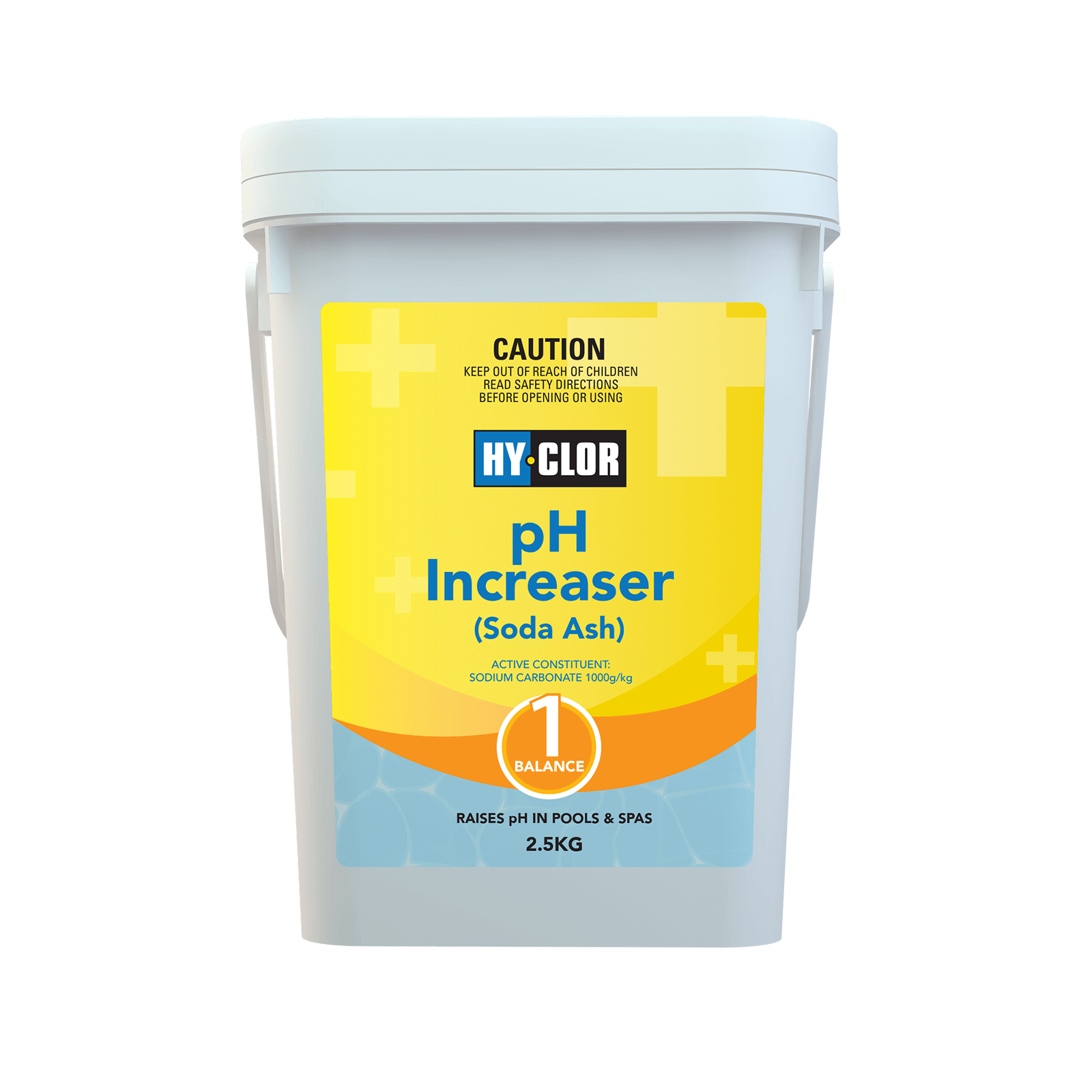
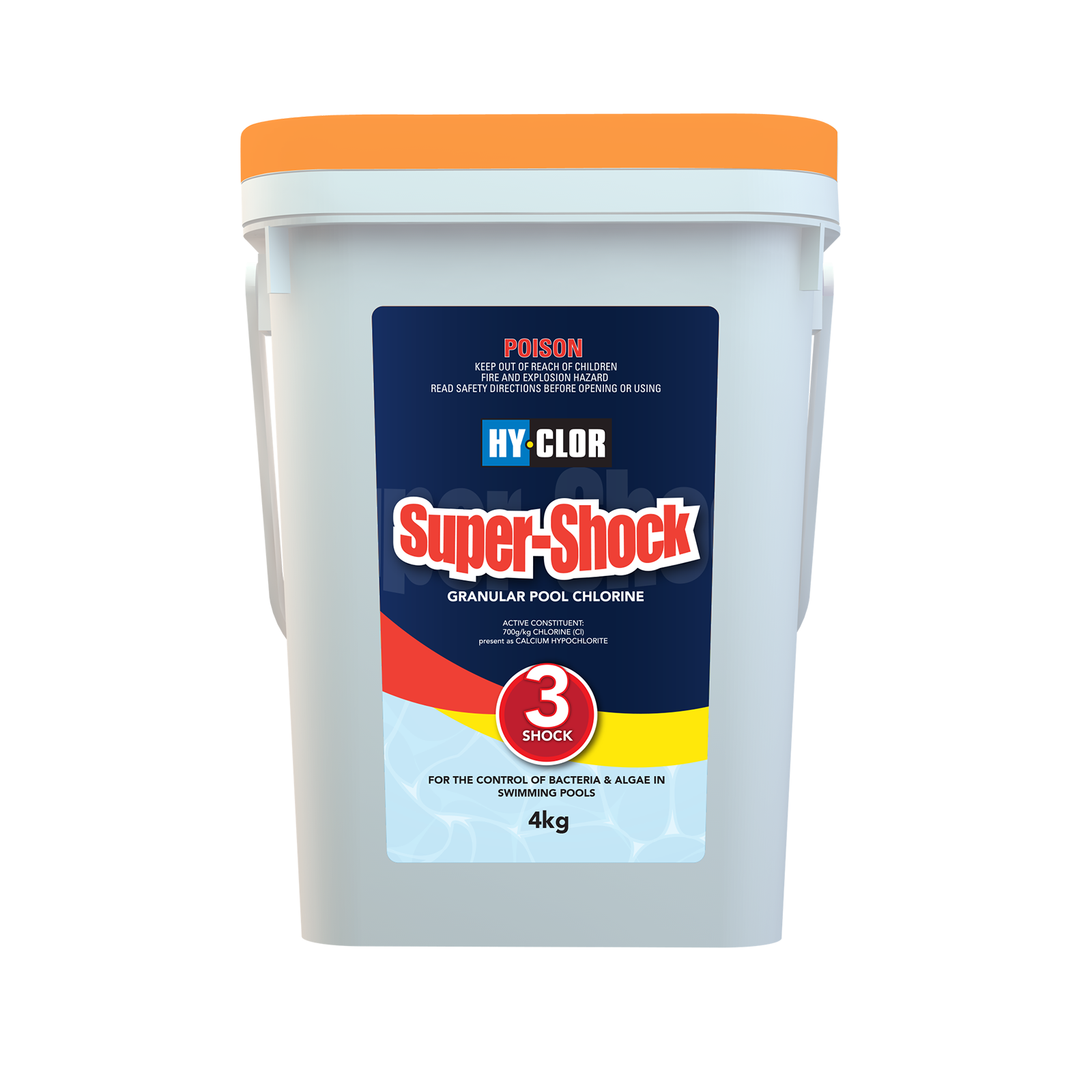
Shock
Shock is a powerful chemical treatment that rapidly raises the chlorine level in your pool water to destroy bacteria, viruses, and algae.
Use shock treatment when you notice these signs in your pool water:
- Significant drop in chlorine levels
- Cloudy appearance
- Unpleasant odour
To use shock in your pool, first test the water’s pH level and adjust it if necessary to ensure the shock treatment will be effective. Then, dilute the shock powder in a bucket of water and pour it around your pool’s perimeter while the pump and filter run. Allow the shock to circulate for several hours before swimming or adding other pool cleaning chemicals to the water.
Stabiliser
Stabiliser, also known as cyanuric acid, protects chlorine in your pool from being broken down by sunlight. It helps maintain consistent chlorine levels, which is crucial for keeping your pool water clear and healthy.
Test your water’s cyanuric acid levels and add stabiliser if the levels are low. Pour the recommended stabiliser dose into a bucket of water and mix thoroughly and pour into the pool while it is running. Alternatively you can add it to a skimmer sock and hang from the side of the pool typically near the returns.
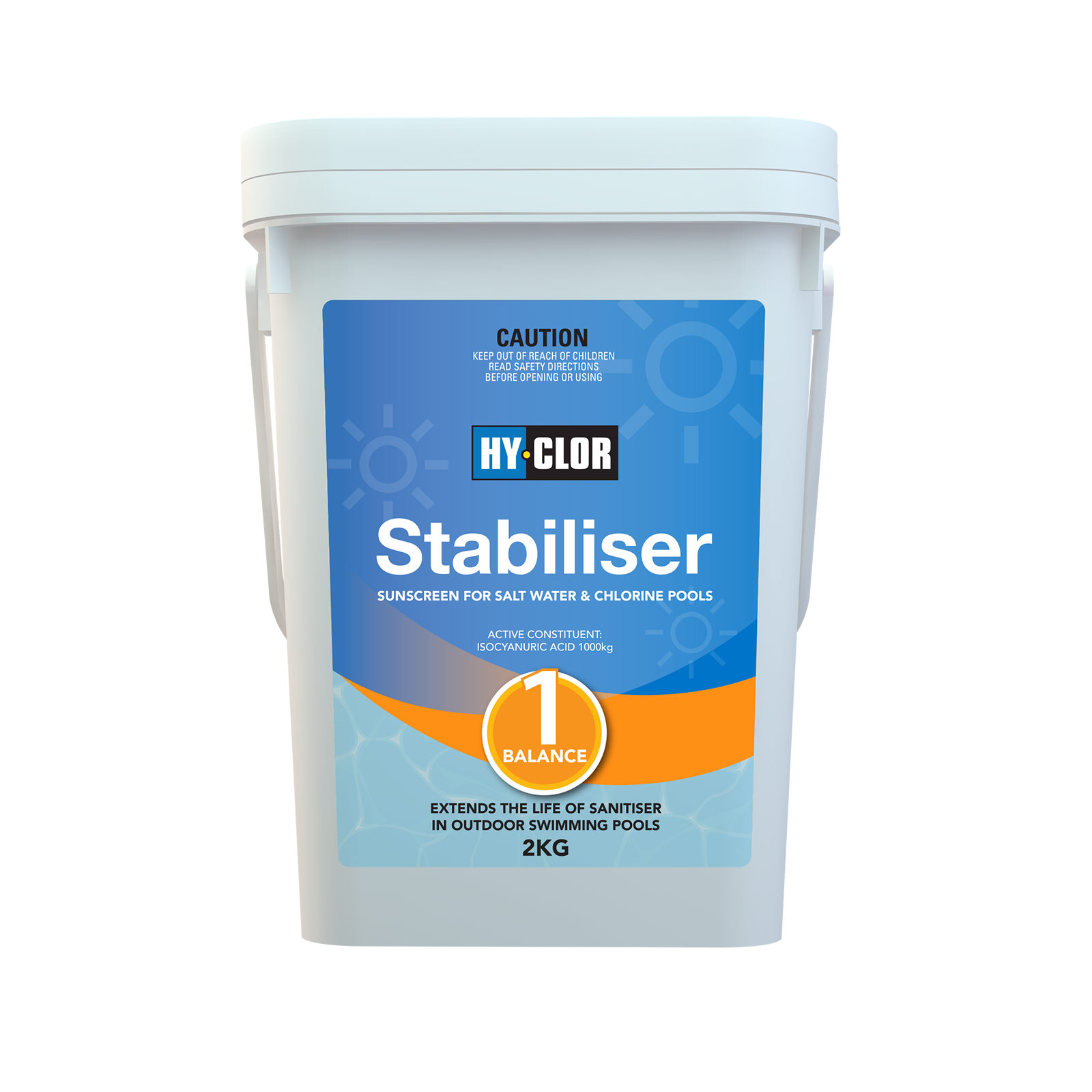
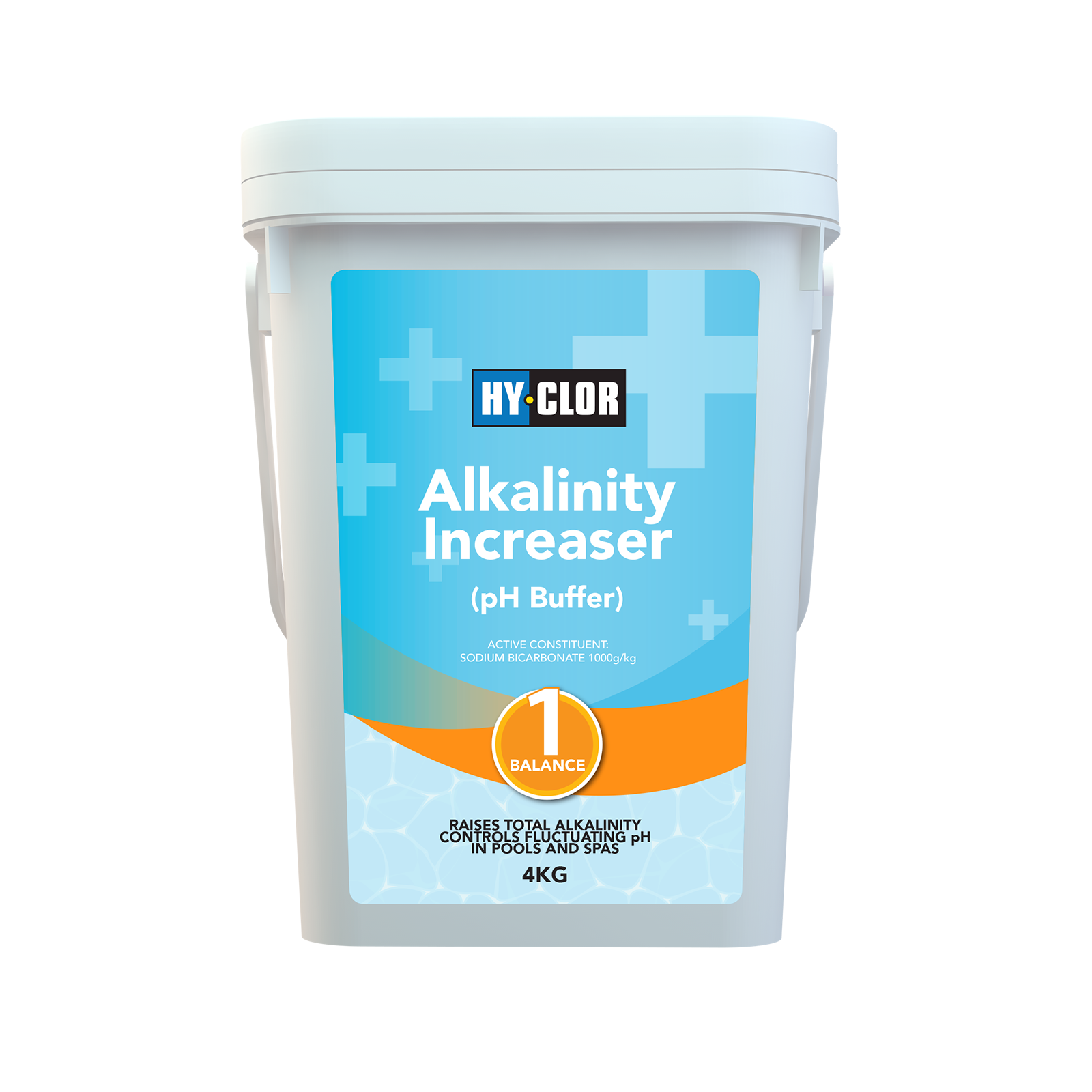
Alkalinity
Alkalinity is an important water chemistry parameter that is used in a pool to help stabilise the pH level of the water. The alkalinity level of pool water is a measure of its ability to resist rapid changes in pH.
By Keeping Alkalinity level within the 80ppm to 120ppm range the water is also more comfortable for swimmers and reduces the need for frequent PH adjustments along with prolonging the life of the pool equipment life.
Salt
Salt is an important part of pool chemistry if you have a chlorinator that makes chlorine for you.
Having enough salt in the water will allow your pool to have a stable chlorine level. Requiring less day to day maintenance.
Your chlorinator has a maximum and minimum level required for salt level, check with your manufacturer for the correct recommended levels.
It’s important to note that while saltwater pools require less maintenance than traditional pools, they still require regular testing and maintenance to ensure proper water chemistry balance.
Additionally, the initial installation cost of a saltwater system can be higher than that of traditional chlorine systems, although the cost savings over time can offset this initial investment.
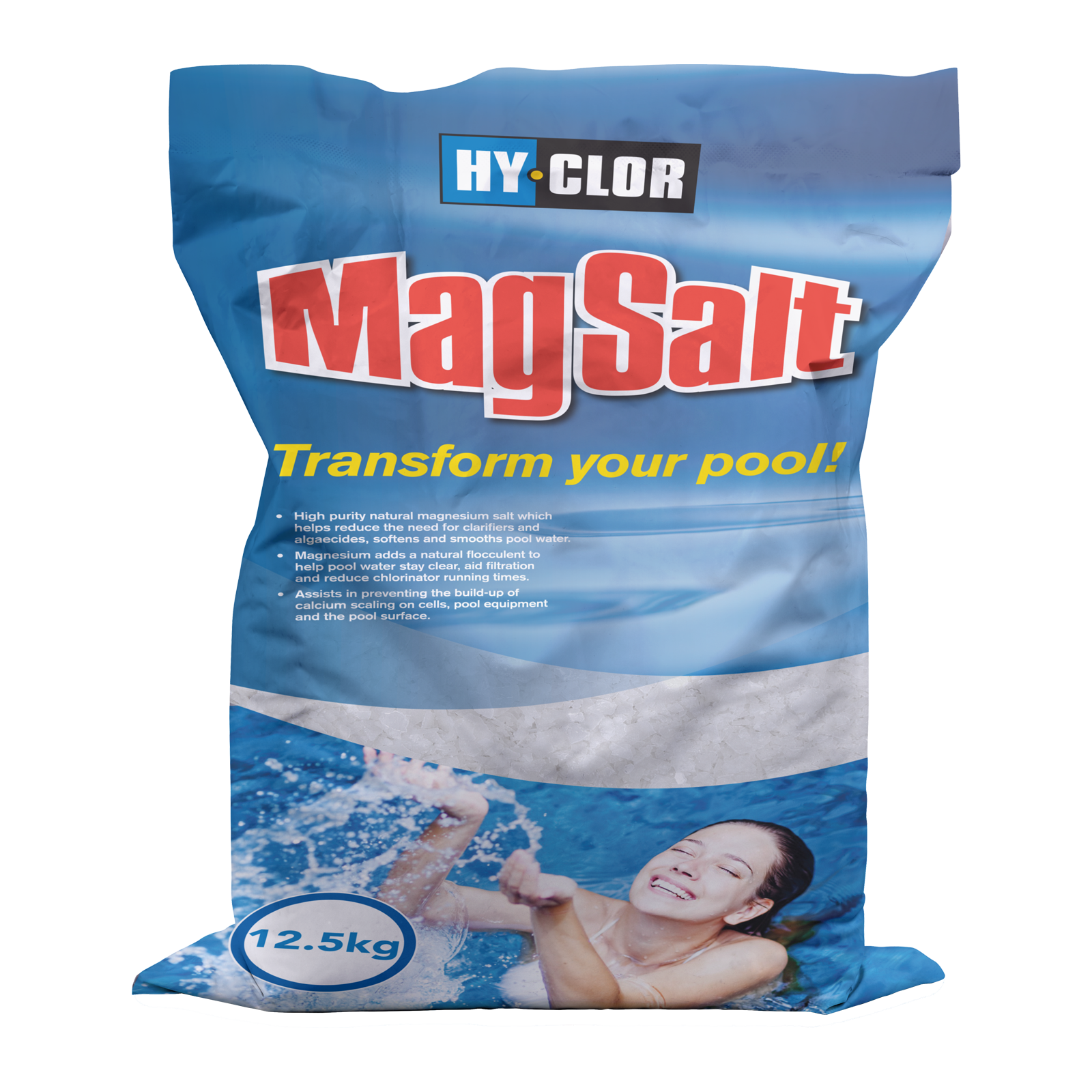
Pool Chemical FAQs
A regular pool maintenance schedule is necessary to keep your pool in top condition. Here’s a suggested schedule:
- Daily: Check your pool’s water level and skim any leaves or debris from the water’s surface.
- Weekly: Use Hy-Clor’s AquaChek Test Strips to test your water’s pH, alkalinity, and chlorine levels and adjust the chemicals as necessary. Also, brush your pool’s walls and clean the pool to remove dirt and excess leaves from the pool floor.
- Every 2-3 weeks: Shock your pool to kill bacteria or algae growing in the water.
- Monthly: Clean your pool filter by backwashing or removing and cleaning the filter cartridges or grids, depending on your filter type.
- Every 3-4 months: Check the pool’s total alkalinity, calcium hardness, and cyanuric acid levels, Salt Levels, and adjust as needed.
- Yearly: Have a professional inspect your pool’s equipment, including the pump, filter, heater, and any other components, to ensure everything is working properly.
Knowing How To Store Pool Chemicals correctly is essential for your family’s safety.
Swimming pool chemicals must be stored in a cool, dry, well-ventilated area, away from direct sunlight, moisture, and heat sources. They must also be kept out of reach of children and pets and away from flammable materials or ignition sources.
Additionally, chemicals should be stored separately and never mixed together, as this can cause dangerous chemical reactions. Keep the original packaging and labels on containers, and never transfer chemicals to different containers.
You should not add certain pool cleaning chemicals simultaneously because they can react and cause dangerous chemical reactions.
Here are some examples:
- Liquid Chlorine and acid (such as muriatic acid or sulfuric acid)
- Shock treatments and acid
- Liquid Chlorine and algaecides
- Liquid Chlorine and shock treatments
- Liquid Chlorine and calcium hypochlorite (Granular Chlorine)
Waiting at least several hours between adding chemicals is vital to allow the chemicals to circulate fully and dissolve in the water.
- Dissolve chemicals separately in a clean bucket of water & pour into the pool
- Never add water to chemicals always add chemicals to water
- Never add chemicals directly to the skimmer box
- Always wait minimum 1 hour after adding chlorine before adding pH decreaser/acid
- Do not pour Granular Chlorine or Super Shock directly into the pool, wait at least 30 mins after mixing to add into pool
- Always remove your pool cleaner prior to dosing any pool chemicals
- Do not add Chlorinating products to pools with a high copper content. If high copper levels are suspected, test and do not add until levels are below 0.2ppm
The exact cost of maintaining a pool varies depending on your local water quality, weather conditions, and pool usage. For more information, read our handy guide, How Much Do Pool Chemicals Cost per Month?
Research suggests on average, Australians spend $1,000 to $1,400 or more on pool maintenance per year.
The average cost of pool chemicals required for yearly maintenance of a 3.7 by 7.3 metre 10,000-gallon in-ground pool is $200.
It’s a good idea to consult with the experts here at Hy-Clor for a more accurate estimate based on your pool’s particular needs.
It’s not necessary or efficient to run your pool pump all the time, as this can lead to excessive wear and tear on the equipment and increase energy costs. The general recommendation is to run your pool pump for at least 8 hours per day during the swimming season to ensure proper circulation and filtration of the water.
The specific amount of time you should run your pump depends on the size of your pool, the frequency of use, and your local climate. Consult a professional pool service technician or refer to your pump manufacturer’s recommendations for optimal pump operation.
No, you cannot use shock instead of chlorine to sanitise your pool water.
Chlorine is the primary sanitiser used to kill harmful bacteria, viruses, and other microorganisms in your pool. Shock treatments quickly raise the chlorine levels in the water to eliminate any organic matter, such as algae or bacteria, that may be present.
However, shock treatments do not provide a consistent and ongoing level of chlorine in your water. Therefore, they cannot be used as a replacement for regular chlorination.
No, algaecide is not the same as shock. Algaecide is specifically designed to prevent and control algae growth in pool water.
Algaecide is a preventive measure or a reactive measure by itself it cannot stop algae from growing.
Here are the swimming pool chemicals recommended to close your pool for the off-season:
- pH decreaser lowers the pH level of the water to help stop scaling and staining.
- Chlorine shocks your pool and kills any remaining bacteria and algae before closing.
- Algaecide prevents algae growth during the winter months.
- Clarifier removes small particles from the water, leaving the water very clear.
The chemicals required may vary depending on your pool and the region where you live. For more information, take a look at our article, What Chemicals Are Needed To Close a Pool?
Talk to a Professional About Pool Care
No, you’ve got this! Several of these chemicals only require intermittent use but it’s great to know what they do.
Now that you know what each of these chemicals are used for, you can manage your pool with confidence.
If you are you still wondering- what pool chemicals do I need?
Hy-Clor’s team of experts is here to help! We can advise you on the
For more information, please fill out our . Alternatively, visit your nearest Bunnings Warehouse for our full range of products.




